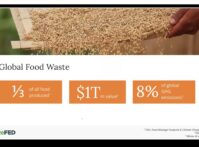-
ECSP Weekly Watch: February 26 – March 1
March 1, 2024 By Eleanor Greenbaum A window into what we are reading at the Wilson Center’s Environmental Change and Security Program
A window into what we are reading at the Wilson Center’s Environmental Change and Security ProgramAssessing Irrigation’s Impact on Pastoralists (The New Humanitarian)
In many African drylands, especially in Kenya, large-scale irrigation projects are attracting significant attention and funding. The concept of “greening the desert” has the potential to create economic opportunity and boost available resources in drought-threatened territory. However, these large-scale projects have often brought negative impacts for pastoral communities.
Irrigation does not fit with the socio-ecological conditions of drylands and cannot easily adapt to climate uncertainty. Such activity can provide drought relief, but ultimately it proves unsustainable in the long-term. In Ethiopia, a recent study found that irrigated sugar production produced lower returns than pastoralism, and also that new dams have displaced pastoralists. This threat to livelihoods brings large costs to communities, the state, and individuals.
Smaller-scale irrigation offers a viable alternative to large-scale projects. These systems are community-based and farmer-led, which allows pastoralists to integrate irrigation into their livelihoods, rather than bring displacement. The reliance on indigenous knowledge can provide a more sustainable solution than large-scale irrigation. If properly implemented, it can not only improve pastoral livelihoods, but also to promote sustainable drought management and farming in drylands.
READ | Climate War in the Sahel? Pastoral Insecurity in West Africa Is Not What It Seems
Sixth United Nations Environment Assembly Kicks Off in Nairobi (Associated Press)
The sixth United Nations Environment Assembly is taking place in Nairobi, Kenya from February 28 until March 1st. Nineteen draft resolutions are on the table for discussion this year, including debates on restoring degraded land, combating dust storms, and reducing the environmental impacts of mining, including critical mineral mining.
Multilateralism has emerged as a major theme in this year’s assembly, which is convened to address three interconnected issues: climate, pollution, and biodiversity. Within this focus, the conference will also work to build upon past agreements. Leaders such as the UNEP director Inger Andersen have emphasized the importance of prioritizing collaborative action to tackle present challenges.
Some observers have expressed pessimism on the potential outcomes from the assembly, particularly a historic draft resolution to phase out hazardous pesticides. Yet others note that there is an opportunity in Nairobi this week to take preemptive action against potential environmental threats and restore faith in international environmental governance.
Solar Panels’ Use in Farming Depletes Groundwater Supplies (Yale Environment 360)
Solar pumps have become extremely popular as a form of groundwater extraction globally. These pumps provide reliable water to farmers at a low cost due to government and international financial institution subsidies, yet scientists warn that their success comes with a price. These solar pumps run the risk of sucking many aquifers dry, with results that could be devastating in the long-run.
This crisis is especially clear in India, where the government wishes to raise the number of solar pumps to 3.5 million by 2026. The country, which already consumes mass amounts of groundwater, will be pushed into crisis with more depletion. This same pattern also is displayed in Sub-Saharan Africa, where many farmers’ water needs remain unmet. Solar-powered farms have been life-changing in Yemen, for instance, but have also notably caused a dip in groundwater supplies.
Water for irrigation is responsible for 70% of these underground water withdrawals, which exceed recharge by 70 cubic miles annually. And monitoring of groundwater supplies is often not strong. Recent research found that aquifers globally are depleting rapidly and at an accelerating rate. To solve this issue, scientists have suggested pumps could include sensors that monitor their output to ensure sustainability, although it is unclear if governments would enforce that in practice.
READ | India’s Climate Tech Revolution Is Starting in its Villages
Sources: The New Humanitarian, Government of Kenya, Ian Scoones, Associated Press, UNEP, Yale Environment 360, Science.org, AGU Journals, Conflict and Environment Observatory, World Bank, Nature
 A Publication of the Stimson Center.
A Publication of the Stimson Center.







